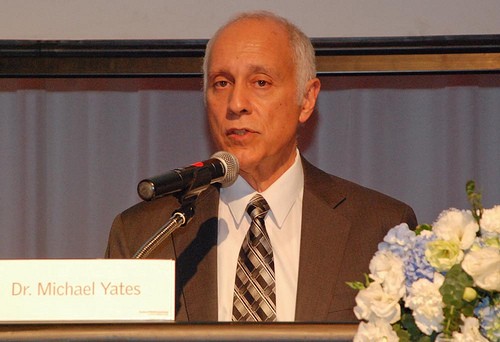Home » News & Information » Speeches » Remarks of USAID Asia Mission Director Michael Yates at the Launch for the Center for Civil Society and Nonprofit Management
Monday, December 16, 2013

USAID Asia Mission Director Michael Yates speaks at the launch of the Center for Civil Society and Nonprofit Management
Richard Nyberg, USAID
BANGKOK, THAILAND
Good Afternoon.
It is a pleasure to be here today at the Bangkok launch for Khon Kaen University’s new Center for Civil Society and Non-Profit Management. This is an historic opportunity for civic leaders to benefit from a curriculum dedicated to building the quality of managers and management systems in non-profit organizations, throughout Thailand and the Lower Mekong region. It is also an historic opportunity for USAID in Thailand to enter into an innovative and important partnership.
Today represents an important step forward in establishing a sustainable academic institution that will offer degree courses and certificate training to strengthen the skills and knowledge of the region’s civil society leaders. Academic coursework will enhance the professional skills of civil society organizations (CSOs), to help their countries move forward.
As the Mission Director for the U.S. Agency for International Development’s Regional Development Mission for Asia (RDMA), I have been asked to speak about Building Partnerships to Support Civil Society in Thailand and the Region. This topic highlights why today’s launch can bring about positive change, not just for Thailand, but for the broader Lower Mekong region.
By way of background, the U.S. government began providing development assistance to Thailand in 1950. Between 1950 and 1996, more than 11,000 Thais were trained in the United States, and more than 100,000 Thais received in-country training in agricultural productivity, science and technology, health and family planning, and infrastructure development.
Although the USAID bilateral mission closed in 1996, given the important advances in Thailand, USAID returned to Bangkok to open a regional development Mission in 2003. This was established to expand opportunities for cooperative solutions to problems that cross national boundaries. These issues include human and wildlife trafficking, HIV/AIDS and other infectious diseases, including drug-resistant malaria, and global climate change. RDMA also works with many partners to address bilateral challenges related to trade and natural resources management across the Asia region.
In addressing these challenges, civil society is a key stakeholder and important partner, for USAID and many around the world. CSOs often play vital roles in helping governments and their citizens to achieve stronger social and economic development.
In fact, Thailand is an important development success story in Southeast Asia, with sustained economic growth and impressive poverty reduction. Thailand – its government, its people, its universities, and its civil society organizations – also continue to look for ways to do more, and to assist other countries in addressing their development challenges. We are pleased to be able to partner on these important efforts, and as our USAID Administrator in Washington, Dr. Rajiv Shah, has emphasized, through innovative partnerships we can achieve great things.
I encourage all to build broader partnerships, including with the private sector, to bring more resources and expertise to address the important development challenges.
The creation of Khon Kaen University’s Center for Civil Society and Non-Profit Management is a great example of the U.S.-Thailand partnership. Khon Kaen University is a leading academic institution, partnering with the United States to bolster civil society and non-profit organizations’ management capacity in Thailand, and the broader region. Strong non-profit management facilitates citizen action to address development challenges and to build a more fair and just society for all.
We are very pleased to celebrate this important event. Any country’s greatest resource is its human resources, and the Center for Civil Society and Non-Profit Management will enrich that resource base, increasing the ability of CSOs to fulfill their potential in working with citizens and their governments to address the most pressing development issues. By providing tools to the region’s civic leaders, raising their profiles and capabilities as professionals, and facilitating the exchange of ideas as a regional institution, Khon Kaen University’s Center for Civil Society and Non-Profit Management will make an important difference in helping all to address development challenges and improve lives. We are privileged to be able to support this important effort.
Thank you.
Issuing Country
Related Speeches
- Remarks by Veena Reddy, Deputy Mission Director, USAID Cambodia, EPIC Showcase
- Remarks by Makara Ou, Governance and Rule of Law Team Leader Office of Democracy and Governance, USAID Cambodia, Collaborative Workshop
- Remarks by Jean-Marc Gorelick, Acting Director, Office of Democracy and Governance, USAID Cambodia, Collaborative Workshop







Comment
Make a general inquiry or suggest an improvement.